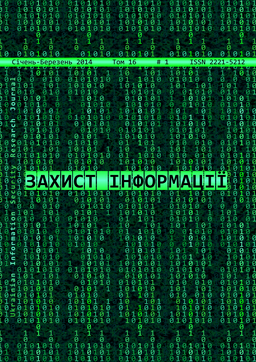Typing of social institutions via encoding method for individual activity as an element of information security
DOI:
https://doi.org/10.18372/2410-7840.16.6314Keywords:
social institution, knowledge, activity, individual, information securityAbstract
Some problems of information security must to take into account the specific features of perception and information processing in a variety of social institutions. Such typology of institutions allows making a more complete management of information security. Existing typologies of social institutions are based mainly on the external characteristics to them. The formal and informal institutions, development and predatory institutions, social and economic, etc. are described. Such typologies of social institutions are mainly used for problems of economic, political, and social security. Known tools cannot directly to use these typologies to problems of information security. The typology is developed for coding of individuals for carrying out activities within the framework of a social institution, using the methods of their training in methods and standards of individual and collective activity, as well as infrastructures, which within the social institution responsible for their training. It is shown that there are three types of social institutions for the encoding of the individual in methods of activity: personality-nominal, professional-nominal and universal-conceptual. The developed typology can describe the important information security features of social institutions, such as institutions of corruption, mafia, terrorism, law, higher education, and information characteristics for interaction between social institutions, which are the different types. The developed typology uses only information characteristics, which describe the activities of man, society and the state.
References
Шиян А. А., Нікіфорова Л. О. Управління формуванням ефективних економічних інститутів для України. — Вінниця: ВНТУ, 2011. — 300 с.
Петров М. К. Язык, знак, культура / Петров М. К. - М. : Наука, 1991. - 328 с.
Shiyan A. A. Typology of Institutions - Theory: Classification of Institutions via the Methods for Transmission and Modification of Knowledge (January 4, 2013) / Shiyan Anatoliy A. and Nikiforova Liliya O. — Available at SSRN: http://ssrn.com/abstract=2196300 or
http://dx.doi.org/10.2139/ssrn.2196300. — 26 р. Distributed in: New Institutional Economics
eJournal. — 2013. — Vol. 5, Issue 4. — January 23.
Acemoglu D. Why Nations Fail: Origins of Power, Poverty and Prosperity / Daron Acemoglu and James A. Robinson. — New York : Crown Business,
— 544 р.
Андреєв В. І. Основи інформаційної безпеки /
В. І. Андреєв, В. О. Хорошко, В. С. Чередниченко, М. Є. Шелест. - К. : Вид. ДУІКТ, 2009. - 292 с.
Богуш В. М., Юдін О. К. Інформаційна безпека держави / В. М. Богуш, О. К. Юдін. — К. : «МК- Прес», 2005. — 432 с.
Shiyan A. A. Types of Economic Behavior: The Instrument for Management of Individuals, Institutions, Countries and Humankind (November, 01 2011)/ Shiyan Anatoliy and Nikiforova Liliya — Available at SSRN: http://ssrn.com /abstract=1952651 or http://dx.doi.org/10.2139/ ssrn.1952651. — 22 р. Distributed in: Information Systems: Behavioral & Social Methods eJournal. — 2011. — Vol 3, Issue 161. — November 15.
Шиян А. А. Теоретико-ігровий аналіз раціональної поведінки людини та прийняття рішень в управлінні соціально-економічними системами /
А. А. Шиян. — Вінниця : УНІВЕРСУМ-Вінниця,
— 404 с.
Shiyan A. A., Nikiforova L. O. Upravlinnya formuvannyam efektyvnikh ekonomichnikh institutiv dlya Ukrainy. [Management for formation of effective economic institutions in Ukraine]. VNTU, 2011, 300 p.
Petrov M. K. Yazyk, znak, kultura [Language, Symbol, Culture]. Nauka, 1991, 328 p.
Shiyan Anatoliy A. and Nikiforova Liliya O. Typology of Institutions - Theory: Classification of Institutions via the Methods for Transmission and Modification of Knowledge (January 4, 2013). Available at SSRN: http://ssrn.com/abstract = 2196300 or
http://dx.doi.org/10.2139/ssrn. 2196300. 26 р.
Distributed in: New Institutional Economics eJournal, 2013, Vol. 5, Issue 4, January 23.
Acemoglu Daron and Robinson James A. Why Nations Fail: Origins of Power, Poverty and Prosperity. Crown Business, 2012, 544 р.
Andreev V. I., Khoroshko V. O., Cherelnychenko V. S., Shelest M. E. Osnovy informatsiynoyi bezpeky [Fundamentals of Information Security]. DUIKT, 2009, 292 p.
Bogush V. M., Yudin O. K. Infirmatsiyna bezpeka derzhavy [National information security]. MK-Press, 2005, 432 p.
Shiyan Anatoliy A. and Nikiforova Liliya O. Types of Economic Behavior: The Instrument for Management of Individuals, Institutions, Countries and Humankind (November 01, 2011). Available at SSRN: http://ssrn.com/abstractM952651 or http://dx.doi. org/10.2139/ssrn.1952651. 22 р. Distributed in: Information Systems: Behavioral & Social Methods eJournal, 2011, Vol 3, Issue 161, November 15.
Shiyan A. A. Teoretyko-igrovyy analiz ratsionaloyi povedinky lyugyny ta pryynattya rishen v upravlinni sotsialno-ekonomichnymy systemamy [Game-theoretic analysis of rational human behavior and decision making in the management of socio-economic systems]. UNIVERSYM-Vinnytsya, 2009, 404 p.
Downloads
Issue
Section
License
Authors who publish with this journal agree to the following terms:- Authors retain copyright and grant the journal right of first publication with the work simultaneously licensed under a Creative Commons Attribution License that allows others to share the work with an acknowledgement of the work's authorship and initial publication in this journal.
- Authors are able to enter into separate, additional contractual arrangements for the non-exclusive distribution of the journal's published version of the work (e.g., post it to an institutional repository or publish it in a book), with an acknowledgement of its initial publication in this journal.
- Authors are permitted and encouraged to post their work online (e.g., in institutional repositories or on their website) prior to and during the submission process, as it can lead to productive exchanges, as well as earlier and greater citation of published work (See The Effect of Open Access).

